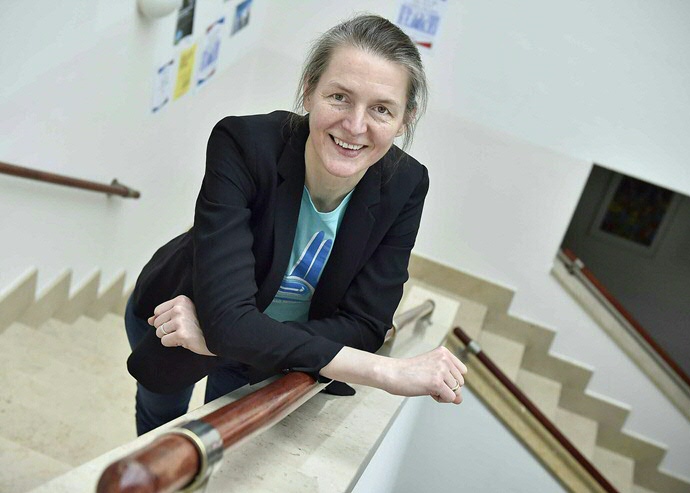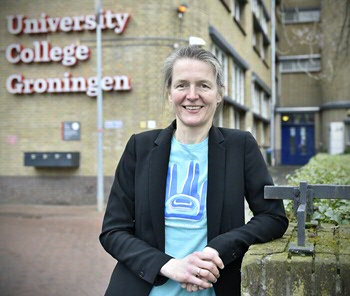Bettina van Hoven: onderzoekster zonder grenzen

Grenzen hebben voor cultureel geograaf Bettina van Hoven weinig betekenis. Het liefst gaat ze erover heen. Want waar verschillende onderzoeksgebieden elkaar raken – of waar een niemandsland is – ontstaat de mooiste wetenschap. Van Hoven doet onder meer onderzoek voor en met senioren in de stad Groningen, waarbij de ouderen meebeslissen in het onderzoeksproces, maar ook zelf interviews doen.
Tekst: Gert Gritter, afd. Communicatie / foto's: Elmer Spaargaren
Dat Van Hoven grenzen en afscheidingen ziet als soms onzinnige en vaak hinderlijke bedenksels is amper verwonderlijk voor iemand met een Nederlandse vader en een Duitse moeder. En die als gevolg daarvan een dubbele nationaliteit heeft. Moeiteloos beweegt ze zich in en tussen beide cultuur- en taalgebieden. Maar niet alleen daar. Ze studeerde en woonde onder meer in het Zuid-Engelse Plymouth, maar vooral in Canada. Sinds haar 17de komt ze regelmatig op Vancouver Island, waar ze verbonden is aan summer schools, haar bacheloronderzoek deed, meewerkte aan een documentaire en een jaar met haar gezin woonde. Haar ‘grenzenloosheid’ geldt ook voor wetenschappelijke disciplines. Ze studeerde biologie in Osnabrück (Groningen was een goede tweede optie) en Plymouth, maar ging geleidelijk in de richting van de geografie. Ze studeerde af als bioloog, maar promoveerde in 1999 als geograaf. Aan de RUG werkt ze nu als universitair hoofddocent culturele geografie aan de Faculteit Ruimtelijke Wetenschappen, maar daarnaast heeft ze een aanstelling bij het multidisciplinaire University College Groningen.
Participatief onderzoek
Van Hoven is een groot voorstander van participatief onderzoek. Het is een methode waarbij een ‘grens’ wordt opgeheven, namelijk die tussen onderzoeksobject en -subject. Dat gebeurt door de doelgroep waarover een onderzoek gaat er actief bij te betrekken. Dat idee kon uitstekend toegepast worden bij de ambitie van de gemeente Groningen om een ‘Age-Friendly City’ worden. In het Engelse Manchester had collega-onderzoekster Tine Buffel eerder al participatief onderzoek gedaan naar Age-Friendly Communities: met hulp van oudere wijkbewoners, die zich hiervoor vrijwillig inzetten. Dit voorbeeld inspireerde Van Hoven en andere geografen aan de RUG eveneens samen te werken met senioren in de Groningse wijk Vinkhuizen. Al met al dus een onderzoek voor én door senioren. Van Hoven: ‘De co-onderzoekers geven richting aan het onderzoek; ze denken en beslissen mee in het onderzoeksproces, doen de interviews met andere oudere wijkbewoners en bepalen hoe hun bevindingen worden gedeeld met een breder publiek. Daarbij helpen de sociale netwerken van de co-onderzoekers in de wijk en hun kennis van de omgeving. Zij kunnen bijvoorbeeld meer ouderen uit de wijk bereiken vanwege de onderlinge vertrouwensband. Vaak kunnen ze zich ook beter dan onderzoekers van de universiteit inleven in de verhalen van leeftijdgenoten over de wijk. Hoewel participatief onderzoek veel tijd vergt (en daarom ook wel ‘slow science’ wordt genoemd), levert het waardevolle informatie op.’

Noorderbrug
Een ander ‘grensoverschrijdend’ project van Van Hoven is de samenwerking met Noorderbrug: een specialistische instelling voor mensen met niet-aangeboren hersenletsel, doofheid met complexe problematiek, een chronische neurologische aandoening en de ziekte van Huntington. Van Hoven: ‘In Groningen trekken studenten van mij samen op met cliënten van Noorderbrug. Zo leren de studenten in de praktijk met welke problemen mensen met een beperking geconfronteerd worden en hoe de ruimtelijke inrichting voor hen beter kan. Hoe is het als je rolstoelgebruiker bent en je wilt gewoon een kroeg bezoeken? Hoe zit het met toiletbezoek? Of als je een voetbalstadion wilt bezoeken en je kunt alleen via de achteringang naar binnen?' Bovendien waren bij dit project studenten van de Kunstacademie Minerva betrokken. Er werden teams gevormd bestaande uit een student van de RUG, een student van Minerva en een cliënt van Noorderbrug. ‘Kunstenaars kunnen helpen een brug te slaan over de kloof tussen wetenschap en publiek. En helpen met het vertalen van denkbeelden en gevoelens. Dat maakt het project juist zo mooi, bijzonder en verrijkend. Er ontstond een groepsgevoel tussen studenten en co-onderzoekers, wat leuke initiatieven opleverde, ook buiten ‘werktijd’. Een student die bijvoorbeeld als hobby bergbeklimmen heeft, regelde dat een co-onderzoeker kon worden opgehesen bij een klimwand, om te ervaren hoe dat was.’
James Bond
In het kader van bovengenoemde project had een van de teams een installatie gemaakt waar foto’s van de ogen van Noorderbrug-cliënten enorm vergroot waren, omdat voor deze jongeren kijken en de rol die ogen daarbij spelen heel belangrijk zijn. Sommigen kunnen alleen communiceren via het systeem van eye-tracking. Ook zien ze aan de blik van de ander hoe zij worden bekeken, bijvoorbeeld doordat direct oogcontact wordt vermeden. `Die foto-installatie was echt een kippenvel-ervaring!’ Een ander team kwam met het idee om James Bond-achtige filmposters te maken van Noorderbrug-cliënten en studenten in de wisselende rol van schurk, held en ‘damsel in distress’. Van Hoven: ‘Daarmee lieten ze zien hoe beeldvorming een rol speelt. Ieder mens heeft meer identiteiten. Zelf ben ik bijvoorbeeld onderzoeker, bioloog, geograaf, moeder, echtgenote, schaatscoach, Nederlander, Duitser enzovoort. In al die hoedanigheden vind ik verwantschappen met andere personen. Er is meer wat ons mensen verbindt dan scheidt.’
Transformatie
‘Studenten worden op deze manier uit hun comfortzone gehaald, wat ook confronterend kan zijn. Ze moeten op een andere manier naar de realiteit kijken en leren zich beter verplaatsen in het leven van een rolstoelgebruiker. Het verandert mensen en in die transformatie ben ik geïnteresseerd. Het gaat erom het hokjesdenken los te laten en ons niet te veel aan te trekken van arbitraire verschillen en scheidslijnen. Niet denken: zo is het, want zo heb ik het geleerd. De universiteit heeft een eigen zienswijze, maar de buitenwereld werkt doorgaans niet op die manier. Zo kan de samenwerking tussen studenten/onderzoekers, co-onderzoekers en kunstenaars maken dat je anders gaat nadenken, andere vragen gaat stellen en andere gesprekken krijgt. Daar gaat het om in de wetenschap, dat wil ik overbrengen op de studenten.’
Op 12 april wordt een dag van participatief onderzoek georganiseerd door RUG en UMCG. Bettina van Hoven geeft hier een workshop over het Noorderbrug-project.
Meer informatie
Meer nieuws
-
01 december 2025
De kracht van beweging
